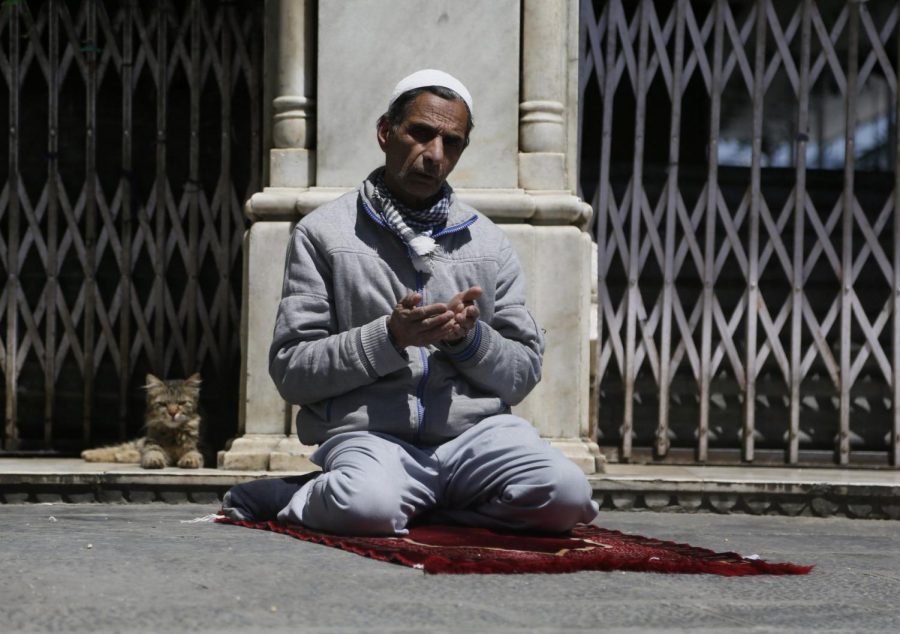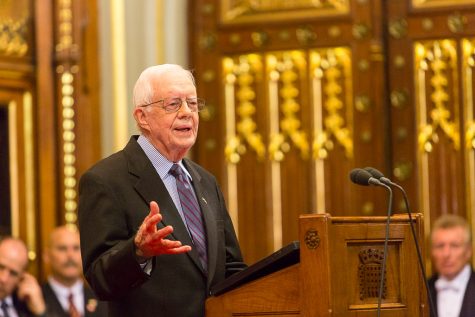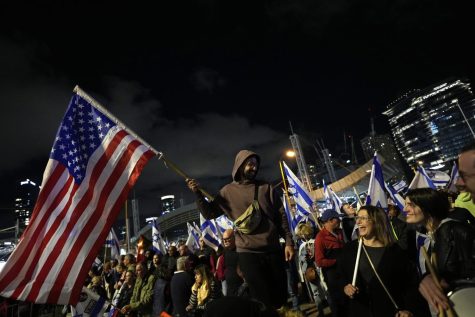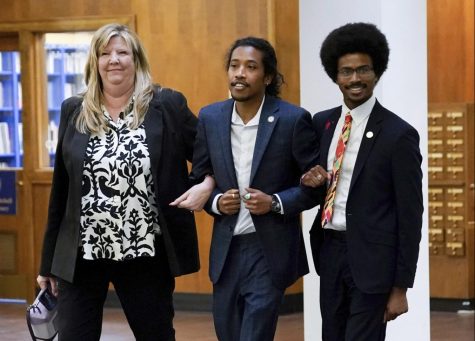What celebrating Ramadan looks like during a pandemic
A Kashmiri Muslim prays, as a cat sits next him outside the closed gate of a muslim shrine during the holy fasting month of Ramadan in Srinagar, Indian controlled Kashmir, Friday, May 8, 2020. Religious clerics and authorities in Indian portion of Kashmir have urged people to pray inside their homes to prevent spread of coronavirus in the region. Muslims across the world are observing the holy fasting month of Ramadan, where they refrain from eating, drinking and smoking from dawn to dusk.
It’s a time where communities around the world stand in solidarity to help those in need and help each other. The month of Ramadan has arrived, but this time, the holy month has been welcomed with the ongoing fear and silence of the global pandemic.
As of May 6, there have been a total number of 3,662,101 global confirmed cases, 257,207 deaths and 1,198,802 recoveries, according to the global counter.
“The light in all this is that I actually get to spend more time helping my mom in the kitchen,” said Hur Raza, a senior at the University of Houston. “My parents always preferred doing iftar at home over the years and I, at the center. So in order to get to the program on time, I would leave quite early; therefore I was unable to help my mom with anything.”
Although the process of fasting can prove to be difficult with eating just one meal before sunrise, suhoor and after evening prayers, iftar is a time when communities come together to strengthen their spiritual connections with their Lord.
There’s happiness and joy in every household as they anticipate the arrival of the blessed month, some families even going as far as decorating their homes with DIY projects to enhance the experience. It’s a time of the year where those who are suffering through trying times find solace and those that are safe, spend nights and mornings praying for the protection of every individual.
People all over the world are somewhat familiar with this auspicious and blessed month in the Islamic calendar and Muslim countries — or countries with a heavy Muslim population — have worked hard to ensure that the month is welcomed in its entirety whilst abiding by the regulations of the CDC and WHO.
“I think the biggest thing is that, this is maybe like a diaspora [where] living in a country that does not usually cater to its Muslim population like Muslim countries do, you don’t have the same facilties or the same understanding from your peers and societal structure so you [experience] temptation a lot,” said Abdul Rafay, a junior at DePaul University. “And I think even that [has] made me a lot stronger in the way that I pursue my religion.”
On April 14, President Donald Trump retweeted conservative writer Paul Sperry’s tweet which said, “Let’s see if authorities enforce the social-distancing orders for mosques during Ramadan (April 23-May 23) like they did churches during Easter.”
In a follow up COVID-19 news conference, the president said, “I would say there could be a difference. And we’ll have to see what will happen. Because I’ve seen a great disparity in this country.”
“Although the intent of the individual making the statement may have malicious intentions and not necessarily be advocating for equality for religious institiutions, it is a great opportunity for the Muslim communities to take this as a challenge, a call to action, and prove to the nation how Muslims are law abiding citizens and not the evil, conniving, and radical beings that the media portrays,” said Raza.
Sudan reports approximately eight million citizens on lockdown to prevent the spread of COVID-19, however, the country is simultaneously facing an economic crisis. This is becoming more and more difficult for families that rely on a day-to-day income as it becomes harder to stock up for the month of Ramadan, a time when food and water both are essential in order to uphold strength to continue observing the fasts.
A centuries old tradition in Jakarta, has allowed Muslims to leave Indonesia to visit their hometowns to welcome Ramadan with their friends and family. However, due to the strict orders of social distancing, authorities have now banned travel from the country, resulting in over 20 million Muslim workers stranded in big cities that they are now struggling to afford living in.
On a national scale, imams and Islamic scholars are encouraging fellow members of the Muslim community to stay at home as they live broadcast congregational prayers, Qur’an recitations and lectures, as well as other prayers and supplications.
“Regarding distancing overall, I think, what I have observed [is] the Muslim community [has] been generally very much aware of the situations we’re living in,” said Babacar Mbengue, an adjunct faculty member at DePaul specializing in Islam in Africa, Islamic finance and Islam and politics.
In India-administered Kashmir, Ramadan is being welcomed in a never-before experience as mosques are sealed and deserted — the Muslim communities opening their fasts and praying in the safety of their own homes. After the tumultuous period of back-to-back lockdowns in the Muslim-majority India subcontinent, Ramadan would have become an opportunity for the Muslims to find solace and tranquility in trying times, however, they have been faced with yet another lockdown.
“Our neighborhood mosque is completely sealed,” said Ghulam Ahmed, a retired government employee for an Al Jazeera report. “Everything is so heartbreaking but it is also a matter of life.”
Similarly, in Jerusalem, the Al Aqsa Mosque continues to remain closed while the streets of the Old City are eerily quiet. Palestinians living in the occupied East Jerusalem are welcoming the month of Ramadan in this new unusual way while also experiencing the economic uncertainty of the lockdown.
Despite the trials and tribulations that people around the world are experiencing in this moment of modern world history, Muslims are still determined to ensure that the month of Ramadan and the fasts are experienced in its full form by working around the current obstacles to ensure that the essential spiritual connection is made.
From having organized youth discussions for men and women about Islamic and current event topics, exchanging recipes on healthy food ideas for suhoor and iftar, FaceTiming friends and family members while beginning and opening your fast, and keeping in contact with friends throughout the day to keep them company if they’re lonely, the Muslim community is unique in finding ways to ensure that people around the world are still able to fulfill the obligations of their religion.
However, while some areas of the world are in their homes, with their friends and families and at least have a portion of food and water to open their fasts with, there are areas such as Yemen, which is currently experiencing one of the world’s worst humanitarian crises. The Muslims continue to observe the fasts in the month of Ramadan despite the lack of food, water and resources needed for the welfare of the people.
Currently in Yemen, there have been a total of 10 confirmed cases of COVID-19, two deaths and one recovery. According to a report by Mwatana for Human Rights and Physicians for Human Rights, between the months of March 2015 to December 2018, there were a total of 120 attacks against medical facilities. The brutal and devastating war in Yemen has also taken the lives of over 100,000 people, but yet the blessed month is still welcomed in hopes of finding tranquility in a war zone.
“What they’ll usually do in Houston is have little basketball tournaments and they’ll be raising funds for Yemen, or Bahrain, or Syria,” said Raza. “I think what we can do now is go a step higher and further.”
While this trying time brings new challenges never before experienced in history and as doctors, world leaders and people around the world write this new moment of history with their experiences, this Ramadan will become the anchor of spiritual connections, humbleness, generosity, charity and blessings for not only the Muslims, but also the non Muslims as well.
“I think as a community we actually have been taught, and I think [that] this is not new in the life of the Muslim community that once in a while we will be tested,” said Mbengue. “And it is [a] part of our faith.”












